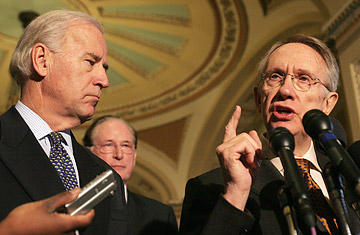
Senate Minority Leader Harry Reid, (D-NV) (R) and Senate Foreign Relations ranking member Joseph Biden, (D-DE) speak with reporters regarding the Iraq Study Group report on December 06, 2006 in Washington, DC.
Take Nancy Pelosi, the future House Speaker. While one of the fiercest congressional critics of Bush and the war, she promised only that her party would give the report's recommendations "full consideration" — not its stamp of approval. Pelosi has been leery of the commission from the start, because she had no hand in picking its Democratic members. Normally legislation setting up such blue-ribbon panels has a clause specifying that congressional Democratic and Republican leaders will have a hand in picking members. But the measure creating this panel, sponsored by G.O.P. Congressman Frank Wolf, left those choices up to the co-chairs, former Secretary of State James Baker and former Indiana Rep. Lee Hamilton. Pelosi "didn't think the commission was constituted properly," says a friend. "That annoyed her."
Other key Democrats are disappointed that the commission's recommendations didn't go as far as they might have. Sen. Carl Levin, who will take over the Senate Armed Services Committee, praised the report for proposing a "comprehensive plan for a change in course, including calling for an end to the open-ended commitment of American troops as a way of pressing the Iraqis to take responsibility for their own future." But he was disappointed the commission didn't specify a timetable for U.S. troop withdrawals — which he wants to begin in four to six months.
Another key chairman-to-be, Joseph Biden, who will take over the Foreign Relations Committee in January, was miffed that the commission dismissed his proposal to federalize Iraq, setting up Shi'ite, Sunni and Kurdish regions run by largely autonomous governments. Shortly after the 96-page report's public release, Biden issued a lengthy critique of its recommendations. The changes the commission proposed, Biden complained, "are necessary, but not sufficient to achieve the objective most Americans share: to leave Iraq without leaving chaos behind." The commission's proposal to beef up U.S. military trainers embedded in Iraqi units while withdrawing U.S. combat troops "is not, by itself, a plan." There has to be "a sustainable political settlement" as well, said Biden.
Baker and Hamilton also faced a grilling at a Senate Armed Services Committee hearing Thursday, where Connecticut Democratic Sen. Joseph Lieberman and Maine Republican Sen. Susan Collins questioned one of their key recommendations: to open a diplomatic dialogue with Iran. "I'm skeptical that it's realistic to think that Iran wants to help the United States succeed in Iraq," Lieberman said.
Congressional Democrats are cautioning that the report will be just one of many recommendations that will influence them when they control Congress next year. "The ISG report is relevant today, but I don't know whether it will be in a month and a half when we take over," says another senior Democratic leadership aide. "Things in Iraq could change. The trend lines could be worse."
If the Democrats are trying to distance themselves from the report, Republicans are taking an even more careful wait-and-see attitude. Save for Sen. John McCain — who sharply criticized the report because it didn't endorse his call for more U.S. troops in Iraq — most Hill Republicans issued bland statements praising the report, then ducked for cover. Texas G.O.P. Sen. John Cornyn said he hoped the report would enable Republicans and Democrats to "set any partisan rancor aside and reach a bipartisan solution to this critical issue." "The feeling on our side is that report seems pretty reasonable," a senior House G.O.P. aide told TIME. "It requires some heavy lifting, but it doesn't ask the Bush Administration to bend over backwards."
The Republicans' reluctance to criticize the report is understandable. Many Republicans in both the Senate and House believe they're now in the minority because of the failed war — and Bush's refusal to fire Defense Secretary Donald Rumsfeld until after the November elections, instead of before, when the move might have saved some of their seats. "Iraq is the anchor around the Administration's ankle," says a senior GOP aide. "A lot of our guys are going to let the Administration take the heat."
